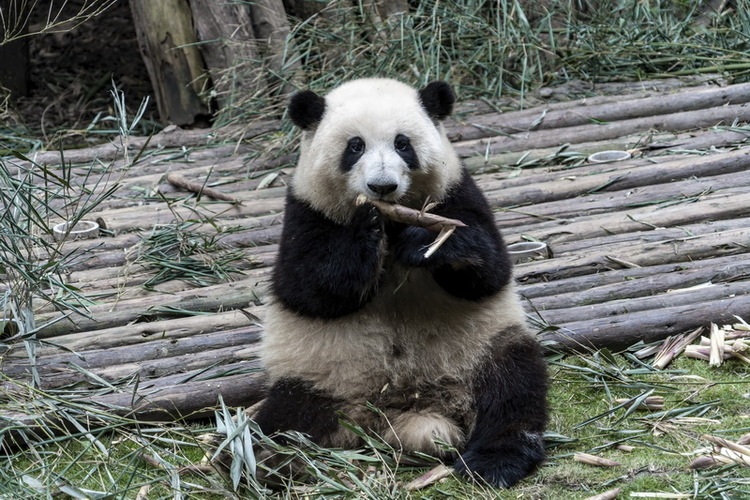
Giant Panda eating bamboos [Photo by Xu Jun]
Whenever it comes to the national treasure animal giant panda, everyone immediately thinks of bamboo and knows that it specializes in eating bamboo. How can it have anything to do with meat? Today, I solemnly tell everyone that giant pandas not only eat bamboo, but also fruits and meat.
In the wild, incompletely digested animal hair and bones can often be found in the feces of giant pandas. In the Wolong Giant Panda Nature Reserve in Sichuan, witnesses have seen giant pandas nibbling on the remains of a leopard eating a deer. Due to its size and speed of movement, it is difficult for it to actively capture larger animals, so when its body needs it, it will choose animal carcasses or food debris abandoned by other carnivores. In the wild, giant pandas can also actively prey on small amphibians and reptiles, young birds, and bird eggs. Its favorite predator is a rodent called a bamboo rat.
This fully shows that the giant panda still retains the meat eating habits of its ancestors. In animal taxonomy, it belongs to the mammalian carnivore order, and belongs to the same order as the carnivore lions, tigers, leopards, bears, and wolves. Up to now, it still retains some characteristics of carnivores in terms of morphology, bones, physiology, and other aspects. Its claws and canine teeth are very sharp, making it easy to capture and bite animals; The intestines are also very short like carnivores, only 5-6 times their body length, while the intestines of general herbivores are very long; The stomach of giant pandas is also very simple, with only one stomach and no cecum, which is different from the digestive system and function of herbivores such as multi stomach animals such as cattle and single stomach animals such as horses. Due to the inability of giant pandas to digest plant fibers in their intestines and stomach, they can only draw nutrients from the juice of bamboo. In order to maintain their physiological needs, they have to constantly eat a large amount of bamboo. Therefore, the digestion of giant pandas has the characteristic of "two quick and two many", that is, they eat quickly and pull quickly, and eat more and pull much. The bamboo shoots it eats are usually excreted in 5 hours, and there are often 3 cm long undigested bamboo shoots in the feces. The bamboo stalks are excreted in about 10 hours. Science and technology workers in the Foping Giant Panda Nature Reserve in Shan xi have observed that an adult giant panda eats 154.4 kilograms of bamboo within 48 hours, defecates 96 times, and feces weigh 85 kilograms. According to observations, giant pandas spend 12 to 16 hours or more eating bamboo every day.
Giant pandas are partial to eating, with a preference for bamboo as their main food. There are over 1300 types of bamboo worldwide, nearly 300 in China, and more than 20 types that giant pandas can eat. The favorite foods for giant pandas are arundinaria faber, big arrow bamboo, and fargesia spathacea franeh, because these bamboo have a light sweet taste, followed by fargesia robusta, fargesia solida, bambusa rutila McClure, phyllostachys sulphurea, etc. They mainly eat these 1-2 year old young bamboo, especially love to eat these bamboo shoots, because the fresh bamboo shoots are not yet fibrotic, crispy and juicy, have good palatability, are rich in nutrients, and contain a large amount of essential amino acids (protein), fats, and sugars for giant pandas, There are also abundant minerals, trace elements, and vitamins. But eating too many bamboo shoots can cause diarrhea, and smart giant pandas can adjust the proportion of bamboo shoots, leaves, and stems to meet their nutritional needs without causing diarrhea. In addition, giant pandas also eat some plants and wild fruits, such as food crops, young cunninghamia lanceolata, heracleum hemsleyanum diels, grasses of gramineae, corylus ferox wall, kiwi, aggregate fruit, loquat, silk and corn, etc.
(Text by Xu Xinjie, Vice Chairman of Henan Zoological Society, Senior Engineer)
Copyright ©1997- by CRI Online All rights reserved